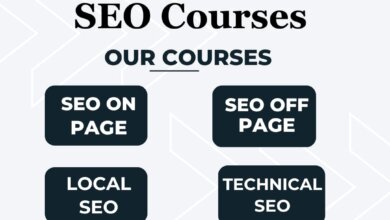Key Features for a Technology or SaaS Company Website in Dubai

Dubai is not just a city of towering skyscrapers and luxury; it is a pulsating hub of technological innovation and a strategic gateway to the Middle East, Africa, and South Asia (MEASA) regions. For a technology or Software-as-a-Service (SaaS) company, establishing a presence here is a statement of ambition and global reach. However, in a market as competitive and discerning as Dubai, your website is more than just a digital brochure—it is your primary salesperson, your trust-builder, Web Design Company Dubai and your 24/7 global headquarters.
A standard SaaS website won’t suffice. To capture the attention of Dubai’s savvy enterprise clients, government entities, and thriving startup ecosystem, your site must be meticulously crafted to resonate with the local business culture, address specific regional needs, and project an image of unparalleled professionalism and reliability. Here are the key features your technology or SaaS website must have to succeed in the Dubai market.
1. Culturally Resonant, Multilingual Design & Content
The first impression is everything, and in Dubai, that means speaking your audience’s language—literally and figuratively.
-
Arabic Localization (Right-to-Left Layout): While English is the lingua franca of business, having a fully localized Arabic (RTL) version of your website is a powerful sign of respect and commitment to the region. It’s not just about translation; it’s about cultural adaptation. Imagery, colors, and content must be appropriate and resonate with a Middle Eastern audience. This feature is non-negotiable for targeting government sectors and larger local corporations.
-
Professional Imagery and Tone: Use high-quality visuals that reflect the Dubai landscape—both its modern infrastructure and its diverse, professional workforce. The tone of your content should be formal yet innovative, building trust while showcasing cutting-edge capabilities. Avoid overly casual language that might not translate well in a corporate setting.
2. Unwavering Focus on Security and Data Privacy
In an era of heightened cyber awareness, and with regulations like the UAE’s Data Protection Law coming into effect, businesses in Dubai are exceptionally cautious about where they host their data.
-
Dedicated Security Page: Don’t bury your security credentials in a footnote. Have a dedicated, detailed page that explains your security architecture, compliance certifications (e.g., ISO 27001, SOC 2), and data privacy policies.
-
Data Hosting Transparency: Explicitly state where your data servers are located. Offering or guaranteeing data residency within the UAE or GCC is a monumental competitive advantage. Many government tenders and enterprise contracts mandate that data never leaves the country.
-
Trust Badges and Certifications: Display logos of security certifications and any reputable clients, especially those in regulated industries like banking or government.
3. Social Proof with Regional Authority
In a relationship-driven market, trust is built on the validation of others. Global testimonials are good, but local social proof is gold.
-
Localized Case Studies and Testimonials: Feature detailed case studies from clients within the UAE and GCC. Use their names and logos (with permission) to build immediate credibility. A testimonial from a Dubai-based company holds more weight than one from a similar company in another continent.
-
Media Mentions and Partnerships: Showcase any features in prominent regional publications like Gulf News, Khaleej Times, or Arabian Business. Also, highlight partnerships with local tech hubs, incubators (like in5 or Dubai Future Foundation), or system integrators.
4. Crystal-Clear Value Proposition and Use Cases
Your audience is busy. They need to immediately understand what you do, who it’s for, and why it matters in their context.
-
Industry-Specific Landing Pages: Dubai’s economy is diverse, with strong pillars in logistics, real estate, retail, travel, and financial services. Create dedicated pages that speak directly to each vertical. For example, “Our SaaS Solution for Dubai Logistics Companies” or “Optimizing UAE Retail with Our AI Platform.”
-
Hero Section Clarity: Within seconds of landing on your homepage, a visitor should know: Your product’s name, what it does, and who it helps. Avoid vague tech jargon. Use a powerful value proposition headline followed by a concise sub-headline.
5. Transparent and Flexible Pricing Strategy
Pricing is a critical decision factor. The Dubai market expects flexibility and transparency.
-
Clear Pricing Page: While enterprise deals will always be custom, having public, transparent pricing for SMB and mid-market tiers builds trust. Display prices in both USD and AED (Arab Emirates Dirham) to avoid confusion and currency conversion headaches for local prospects.
-
Request a Demo/Quote CTA: For enterprise-level sales cycles, the primary call-to-action (CTA) should be “Request a Demo,” “Schedule a Consultation,” or “Contact Sales.” Make this button prominent and high-contrast across your site.
6. Seamless, Multi-Channel Communication
The expectation for service in Dubai is high. Your website must facilitate effortless communication.
-
Local Contact Information: A P.O. Box number and a local landline number (with a +971 area code) instill significantly more confidence than only a foreign number or email. If you have a physical office, display the address.
-
Live Chat with Human Handoff: Implement a live chat function (e.g., Drift, Intercom) that is manned during Dubai business hours (GMT+4). The ability to get an immediate response to a pre-sales question can be the difference between capturing a lead and losing it.
-
WhatsApp for Business Integration: WhatsApp is the dominant communication platform in the region. Integrating a click-to-chat via WhatsApp button is not a luxury; it’s an expectation for many local businesses.
7. Robust Content Marketing Hub
Position your brand as a thought leader, not just a vendor. Educate your market on the value of your technology.
-
Blog with Regional Insights: Your blog shouldn’t just repurpose global content. Create articles that address regional challenges, highlight local success stories, and comment on UAE-specific tech policies and trends (e.g., “How AI is Transforming Dubai’s Smart City Initiatives”).
-
Resource Library: Offer whitepapers, e-books, and webinars that provide genuine value. Gated content is an excellent way to generate high-quality leads in exchange for deep-dive insights.
8. Technical Performance Optimized for the Region
A slow website is a dead website. Performance is a feature.
-
Localized Hosting and CDN: Ensure your website is hosted on a server geographically close to the UAE or use a Content Delivery Network (CDN) with points of presence (PoPs) in the Middle East. This drastically reduces load times for your local audience.
-
Mobile-First Design: Smartphone penetration in the UAE is among the highest in the world. Your website must be flawless on mobile devices, with fast loading times and easy navigation.
9. Clear Path to Conversion and Onboarding
Guide your visitor effortlessly from discovery to action.
-
Strategic CTAs: Use clear, action-oriented language on your buttons (“Start Your Free Trial,” “Get a Demo,” “Download the Whitepaper”). Place them strategically throughout the customer journey.
-
Streamlined Trial Sign-Up: If you offer a free trial, make the sign-up process frictionless. Ask for only the essential information to get them started. Complicated forms will be abandoned.
10. Integration with Local CRM and Marketing Automation
Finally, your website must work seamlessly with the tools you use to manage your regional pipeline.
-
CRM Integration: Ensure form submissions, chat inquiries, and demo requests are instantly routed into your CRM (like Salesforce or HubSpot) and assigned to your Dubai-based sales team.
-
Region-Specific Nurturing Sequences: Develop email automation sequences that welcome leads, provide local case studies, and invite them to regional webinars or events.
Conclusion: Your Website as Your Strategic Partner
For a tech or SaaS company in Dubai, your website is the cornerstone of your market entry and growth strategy. It must do more than just explain your product; it must build bridges of trust, demonstrate cultural fluency, Web Development Dubai and assure prospects of your commitment to the region’s unique requirements. By implementing these key features—from Arabic localization and data residency assurances to local social proof and seamless communication channels—you transform your website from a static page into a dynamic, high-performing digital asset capable of conquering one of the world’s most exciting and lucrative markets.



